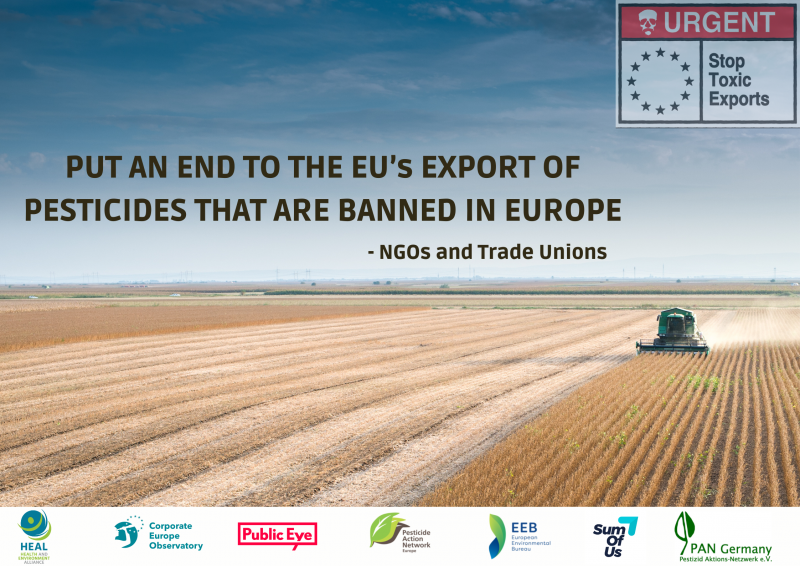
The need for an EU-wide ban on the export of banned pesticides and hazardous chemicals
Why do EU-policymakers need to act and how?
Although many pesticides and hazardous chemicals are banned in the European Union in order to protect human health and the environment, huge quantities of these very same toxic products are still produced and exported by EU companies to third countries, where often safety regulations are weaker and less strictly implemented. The European Commission announced two years ago to do a proposal to tackle this double-standard that according to UN-rapporteur represents violations of human rights. But the EC is now dragging it's feet which is why CEO with a coalition of NGO's organises an event on December 1: 'An EU-wide ban on the export of banned pesticides and hazardous chemicals - Why do EU-policymakers need to act and how?'
Watch the video recording of this event here
For instance, in 2018 alone, more than 81,000 tonnes of pesticides containing 41 different hazardous chemicals banned on EU agriculture fields, were exported to be used in other countries.
On 14 October 2020, the European Commission presented its Chemicals Strategy for Sustainability, where it promised to “lead by example, and, in line with international commitments, ensure that hazardous chemicals banned in the European Union are not produced for export, including by amending relevant legislation if and as needed." However, in October of this year, the European Commission shared its Work Programme for 2023 and it still does not include the promised action to stop these exports.
The European institutions and Member States need to take urgent action, and this conference provides facts and arguments of why and how it can be done.
This conference gathers key actors from across the world to share their concerns on the impacts that European exports of pesticides and hazardous chemicals have in third countries. It aims to urge European policymakers to open their eyes to the repercussions of such discriminatory practices and take action.
A joint statement by over 300 civil society groups, farmers organisations and trade unions was presented at this event.
PROGRAMME
09:15 - 09:30 Opening by the Chair Session 1, Eva Corral, The European Environmental Bureau, Senior Policy officer for Pesticide and Water pollution
09:30 - 10:45 Session 1 The EU’s exports of banned pesticides and their impacts on importing countries
Introduction by Dr. Marcos A. Orellana, United Nations Special Rapporteur on toxics and human rights (prerecorded video) (5 mins)
“The impact of pesticides on farmworkers in Africa”
Mopholosi Morokong, IUF, Occupational Health and Safety Officer for Africa (online)
“The EU’s-banned pesticide exports”
Laurent Gaberell, Public Eye, Agriculture and food expert
“Main findings of a new study on exports of banned pesticides from Belgium”
Jonas Jaccard, SOS Faim/Pesticide coalition, Advocacy Officer
“The voices of the impacted communities”
Brazil: Operação Amazônia Nativa (OPAN) (prerecorded video),
Larissa Mies Bombardi, Researcher at the Department of Geography, University of São Paulo
Fobi Miterand Asoh, Founder of NANNY Africa, Member of the One Health Network of Civil Society Organizations of Cameroon (ROOHCAM), Cameroon (prerecorded video)
Ahmed Tiamiyu, Executive Director of Community Action Against Plastic Waste (CAPWs), Nigeria (prerecorded video)
Dr. D. Narasimha Reddy, PAN India, Consultant, India (online)
“Q&A session with participants”
10:45 - 11:00 Coffee break
11:00 - 12:30 Session 2 Why an EU ban on the export of banned pesticides and hazardous chemicals is needed and how to do it.
Opening by Chair Session 2, Martin Dermine, PAN Europe, Executive Director
“Views from Member States supporting export bans”
Belgium: Ms. Zakia Khattabi’s, Minister of Climate, the Environment, Sustainable Development, and Green Deal
France: Crispin Dowler, Acting Co-Editor, Unearthed, The French pesticide export ban, UK (online)
“NGOs Joint-Statement, time to put an end to double standards”
Nina Holland, Corporate Europe Observatory, researcher and campaigner
“An EU-wide export ban, What is the European Commission planning?”
Patrick Child, Deputy Director General DG ENVI, European Commission
“Closing remarks from Members of the European Parliaments (MEPs)”:
MEP Maria ARENA (S&D), MEP E. Andrieu (S&D) (TBC)
“Q&A session with participants” (15 mins)
“Petition to Commissioner Sinkevičius” (5 minutes)
Eoin Dubsky, SumOfUs, Senior Campaign Manager
Closing by the Chair, Dr. Martin Dermine, PAN Europe, Executive Director
